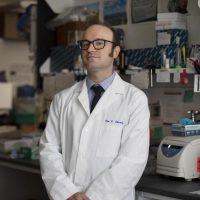Lancet commentary seeks to correct COVID-19 vaccine misinformation
March 18, 2021

Dr. Timothy Sheahan stands in the Baric Lab. (Photo by Megan May/UNC-Chapel Hill)
As part of The Lancet’s Commission on COVID-19 Vaccines and Therapeutics Task Force, Assistant Professor Timothy Sheahan, PhD, has contributed to a new primer for health care providers addressing common misinformation about COVID-19 vaccines.
In the United States, hesitancy around the COVID-19 vaccine has been high — even among health care workers — in contrast to the growing acceptance rate of vaccines overall. Concerns about efficacy, quality and speed of development have all played a role in public perception of the vaccine, as well as uncertainty among communities that have historically been harmed by scientific misconduct and structural racism in health care. Partisan and anti-vaccine advocates have often exploited these concerns to further spread misinformation.
“Vaccination is our best weapon to put the brakes on the COVID-19 pandemic, but there is a lot of conflicting information out there which may give people pause on whether or not to get vaccinated,” Sheahan said. “This is a life or death situation here, and The Lancet Commission is trying to set the record straight and give health care professionals and the general public the tools to understand vaccine safety and dispel myths that make people hesitant to get vaccinated.”
Sheahan, a virologist in the Department of Epidemiology at the UNC Gillings School of Global Public Health, is part of the team that tested the broad-spectrum antiviral drug remdesivir, which gained FDA approval for emergency use treatment of COVID-19 after clinical trials showed that it improved recovery times for infected patients. He is also part of the team that developed and tested the antiviral drug EIDD-2801, also known as molnupiravir, which is currently being tested in human clinical trials for safety and effectiveness to treat COVID-19.
He joined the Commission on COVID-19 Vaccines and Therapeutics Task Force in September 2020.
The article serves as a primer to assist providers in developing cogent and evidence-based answers to misinformation that the public may encounter. It debunks common misconceptions about rushed vaccines, mandatory vaccination and genetic manipulation, as well as other areas of concern linked to conspiracy theories.
“It is imperative that government leaders prioritize evidence-driven communication strategies in their COVID-19 vaccine programs,” the Commission writes, “while health care providers maintain situational awareness, respond to public concerns and counter unfounded claims by those seeking to undermine public confidence in vaccines.”
“Friends and family ask me all the time, ‘which vaccine should I get?’ and my answer is always that I would get any vaccine you can whenever you can,” said Sheahan. “All three vaccines available in the U.S. are 100% effective at preventing death by COVID-19. When I do the math, the answer is clear. Vaccines are lifesavers.”
Contact the UNC Gillings School of Global Public Health communications team at sphcomm@unc.edu.
